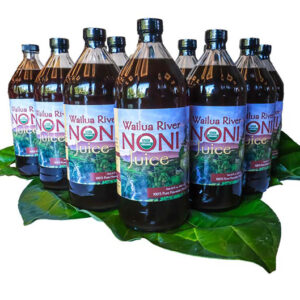What Happens as Noni Ages
Researchers studied what actually happens as noni fruits ripen and then age in sealed containers — the traditional Polynesian method…
Phytochemical Analysis of Noni Roots, Leaves, and Fruits: Unlocking the Power of Noni Powder
Noni Powder Organic noni powder, made from the fruit, leaves, and roots of Morinda citrifolia, offers a convenient way to…
A Daily Scoop of Wellness: Unlocking the Power of Noni Powder
Noni (Morinda citrifolia) has been used for centuries in traditional wellness practices across the Pacific Islands and Asia. Today, its…
Enzyme Activity & Antioxidant Potential of Organic Noni Juice
Organic Noni Juice, derived from the tropical Morinda citrifolia plant, has been enjoyed for centuries in Southeast Asia and the…
Noni Fruit’s Natural Benefits: A Source of Antioxidants and Wellness Support
Is organic juice good for you? This is a question many health-conscious individuals ask, and when it comes to the…
What Research Says About Noni Juice Organic and Liver Health
Noni juice organic has gained attention for its potential role in supporting overall liver health. Researchers have been exploring how…
Noni Fruit’s Antibacterial Effects: A Natural Defense Against MRSA
A recent study from Airlangga University in Indonesia investigated the antibacterial effects of methanol extract from *Morinda citrifolia* (noni) fruit…
Traditional and Modern Uses of Noni: A Natural Remedy Backed by Science
How to prepare noni fruit juice at home can be a transformative experience—one that connects traditional wisdom with modern wellness…
The noni fruit: A review of agricultural research, nutritional and therapeutic properties
The noni fruit, scientifically known as Morinda citrifolia, has been treasured for centuries for its remarkable nutritional and wellness properties.…
Noni Juice from Hawaii: A Natural Way to Support Wellness and Ease Everyday Discomfort
Noni juice, derived from the fruit of Morinda citrifolia, has a long history in Polynesian traditional practices, including in Hawaii.…
A Safety Review of Noni Fruit Juice
Introduction: What is Noni? Noni juice is a globally popular health beverage derived from the tropical fruit of the Morinda…
An evidence-based review of Morinda citrifolia
This evidence-based review comprehensively analyzes the health benefits and safety of Morinda citrifolia (noni) fruit using animal studies, human trials,…
From Traditional Healing to Superfood: The Modern Story of Noni
Source: Pacific Health Dialog, Volume 12, Issue 2, Pages 111–115, Published September 2005 Title: From Polynesian Healers to Health Food…
Does Noni Juice Have Anti-Cancer Potential? New Findings
Source: Engineering Proceedings, Volume 11, Paper 16, Published October 15, 2021(Presented at the 2nd International Electronic Conference on Applied Sciences,…
Noni Juice and Inflammation Support: What the Research Says
Introduction Morinda citrifolia, commonly known as “noni,” is a tropical plant used for centuries in Polynesian wellness traditions. Known by…
What the Research Says About Noni (Morinda citrifolia)
A comprehensive 2016 review published in the Pharmacognosy Journal surveyed over 300 scientific studies on the noni plant (Morinda citrifolia),…
What the Research Says About Noni (Morinda citrifolia)
A comprehensive 2016 review published in the Pharmacognosy Journal, Vol 8, Issue 4, Jul-Aug, 2016, surveyed over 300 scientific studies on the noni plant (Morinda citrifolia), a tropical fruit long used in traditional medicine throughout Polynesia, India, and Southeast Asia. The review explored both the chemical composition and potential health-supporting properties of noni juice and other parts of the plant.
Key Points from the Research:
-
Rich in Nutrients: Noni juice contains vitamins (C, E, B-complex), minerals (potassium, calcium, magnesium), amino acids, and a wide range of antioxidants such as flavonoids and iridoids.
-
Traditional Uses: Historically, noni has been used for a wide variety of wellness purposes including supporting digestion, joint comfort, skin health, and immune function.
-
Lab and Animal Studies: Various plant compounds in noni (such as damnacanthal, scopoletin, and polysaccharides) have been studied for their antioxidant, anti-inflammatory, and cell-protective actions in laboratory settings.
-
Clinical Trials: The paper notes that human studies have explored noni juice’s potential role in supporting cardiovascular health, reducing oxidative stress in smokers, and promoting immune response. One study suggested a positive effect on joint comfort in people with osteoarthritis.
-
Safety: The review included several clinical safety studies showing that noni juice was well tolerated by most participants when consumed in moderate amounts.
Important Note:
This summary is for educational purposes only. The review discusses noni in general and not any specific brand or product. While the findings are promising, more research is needed to fully understand how noni may support human health.
These statements have not been evaluated by the Food and Drug Administration. This product is not intended to diagnose, treat, cure, or prevent any disease.








